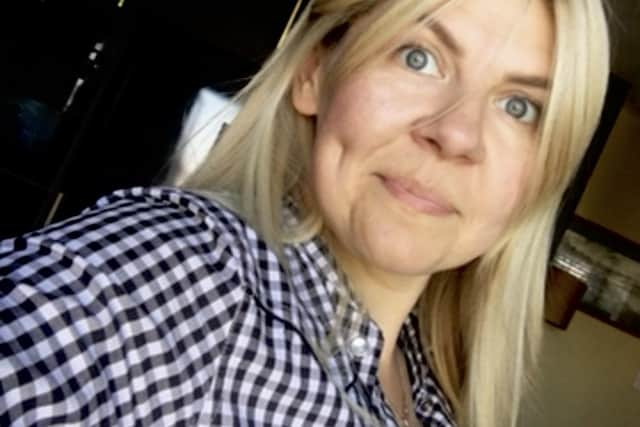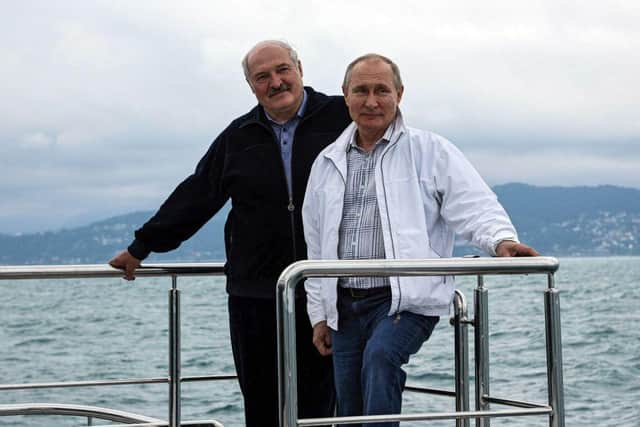Belarusians in Scotland fear Russian conflict could scupper hopes of democracy in their home country
However, 15 months later, escalating tensions between Russia and Ukraine – with Belarus a key geographic pawn in the conflict – have led Belarusians living in Scotland to fear their chance for change has disappeared.
In recent days, Russian troops have been placed along the Ukrainian frontier of the former Soviet state for joint military exercises, which many fear is a precursor to an invasion. Moscow insists it has no plans to invade Ukraine but has at the same time laid down a series of security demands - including a ban on Ukraine joining NATO - in exchange for de-escalation of the situation.
Advertisement
Hide AdAdvertisement
Hide AdSocial media videos from Belarus - which also borders European Union members Poland, Lithuania and Latvia - have been published, which appeared to show military vehicles arriving on Russian state railway carriages, while Alexander Volfovich, the head of Belarus’s security council, said in a briefing that troops were arriving before exercises scheduled for February.


NHS worker Irina McLean, who was born in Belarus, but has lived in Scotland for 11 years and represents the People’s Consulate for Belarus in Scotland, fears Russian troops on the ground in the country – and dictator Alexander Lukashenko’s increasing close relationship with Russia – could scupper any hopes of democracy.
Daily protests broke out after Lukashenko - who has been in power since the 1990s - declared election victory for the sixth time in August 2020.The main opposition candidate, Sviatlana Tsikhanouskaya, was widely believed to have won the majority of the vote, however, she was forced to flee the country immediately after the election. Lukashenko has long been backed by Putin, although the links have strengthened recently. In September, the leaders met to sign an agreement integrating the two countries’ economies, ahead of a separate set of joint military exercises.
Last year, the daily protests eventually came to a halt after months of unrest amid mass arrests of protesters – and media which did not back the president.
Ms McLean, who lives in Edinburgh, believes Russian propaganda – that the West, and specifically NATO, is a threat to the region – is already infiltrating Belarus.


"It is cancelling all of the effort – Putin is just coming along with a big stick,” she says. “What people need to remember is that Belarus was on the brink of a civil war – there were those who agree with Lukashenko and those who don’t. Now Putin has boots on the ground, although he claims it is for defence.”
She says the nation could no longer sustain protests, when critics of the government were being put in prison on a daily basis.
"The brutality became unbearable,” explains Ms McLean, whose last close family member – an aunt – fled Belarus last year amid fears over outspoken social media comments which were critical of the government. She is now seeking asylum in Germany.
Advertisement
Hide AdAdvertisement
Hide Ad"Belarus is subdued to Russia. There are international sanctions against Belarus [because of the political situation], but because Russia, the Big Brother, is watching every move of the dictator’s establishment, then democracy and democratic forces from abroad have little or no chance of returning democracy to Belarus, because Russia is behind everything. Nothing will stop Russia, regarding its borers and somehow they think that Ukrainian and Belarusian borders are Russian.”
Thousands of political prisoners are still being held in Belarus. MSP Willie Rennie, of the Scottish Liberal Democrats, has “adopted” imprisoned journalist, Volha Loika, an editor at news website tut.by. Loika was arrested on 18 May last year, accused of tax evasion under Article 243 of the Belarusian Criminal Code. MSP Liam McArthur has also “adopted” political prisoner Aliaksandr Ivulin, a football player for FC Krumkachy, who runs YouTube channel Chestnok – who is awaiting trial in a pre-trial detention centre for alleged “acts of a group grossly disturbing public order”.
Mr Rennie has put forward a parliamentary motion opposing the “wrongful detention of, and violence towards, political activists and journalists” in Belarus.
"We are hoping that the motion will be put forward and a parliamentarian group will be established at the Scottish Parliament,” says Ms McLean. “We hope some moves will then be a bit stronger. Legislatively, obviously Scotland can’t do as much as Westminster, but there is an interest and that democratic support is always welcomes.”
Mr Rennie says: “There are huge numbers of political prisoners and a lot of them seem to be ordinary people, who have just been involved in normal protests. I feel rather helpless, being so far away from the tyrannical regime, which has shown complete disregard for human rights.
"It is that steady, solid protest over a long period of time that keeps a gentle pressure and make sure ministers keep it high on the agenda, so it’s not forgotten, as well as bit of hope, if you can ever get a message to these people in prison that they’re not alone – and also people in Belarus who continuing to keep up the fight for human rights and justice.
"I would like to see the Scottish Government speak up. In some ways, it is the moments that they have private discussions with UK ministers, or ministers from other countries, that they need to mention it. It’s making sure that it’s on the priority list and isn’t just a tick box.
"It is very dark just now. Russia is flexing its muscles and using every bit of influence with its neighbours and is acting in an aggressive fashion. It is possible that could make it more difficult to make a change in Belarus and make it worse.”
Advertisement
Hide AdAdvertisement
Hide AdProfessor Luke March, personal chair of post-Soviet and comparative politics and deputy director of the Princess Dashkova Russian Centre at the University of Edinburgh, agrees. He says that Belarus’ key geographical location is important to Putin, who is likely to make any invasion into Ukraine from the Belarusian border.
"It reduces any room for manoeuvre,” he said. “Lukashenko has made a bet with the devil, in terms of getting Putin behind him. I think it would be one thing to unseat him without the military logistical backup, but if he's got Putin dialled in, that's going to make it lot harder. If troops in Belarus are used as a launchpad for invasion of Ukraine, then that’s going to add to the physical intimidation of people, having armaments going through the streets to the south, that puts pressure on as well.
"Without any back up, things might have turned out very bad for Lukashenko, but now, things are very different. He was a rabbit in he headlights at one point, then he took what even for him was a much more extreme tack of absolutely cracking down without any concerns whatsoever, which one would imagine had at least tacit logistical support from Moscow.”
He believes the tensions between Ukraine and Russia could last weeks before coming to a head, drawing parallels with Russia’s five-day war with Georgia in 2008. Ukraine claimed last weekit was facing a barrage of bomb threat hoaxes which it claims were being orchestrated by Russia.
Prof March says: "They're looking for a way in which they could just say that Russia - or Belarus - has been attacked so that they could respond. Like in Georgia, they marched towards Tbilisi, just to raise the threat as though they were going to take the capital - and then they stopped. It could be something like that: a quick in and out that would say, ‘Look, this is what we can do. And we're going to go further if you don't capitulate’. It’s just ratcheting up the pressure, but the real risk here is that they get drawn in.”
A message from the Editor:
Thank you for reading this article. We're more reliant on your support than ever as the shift in consumer habits brought about by Coronavirus impacts our advertisers.
If you haven't already, please consider supporting our trusted, fact-checked journalism by taking out a digital subscription.
Comments
Want to join the conversation? Please or to comment on this article.
